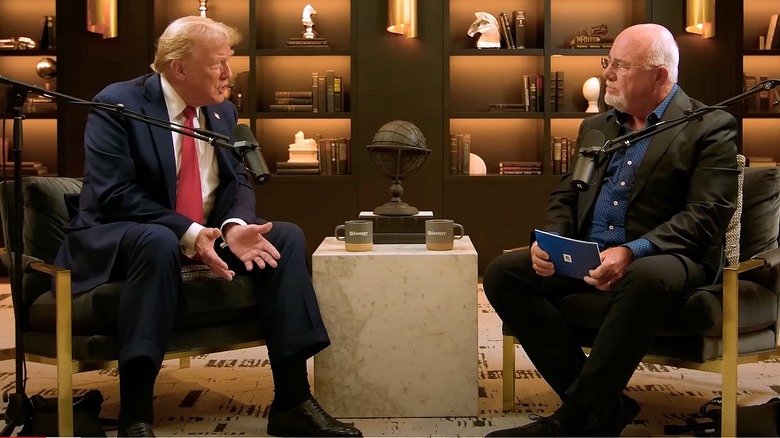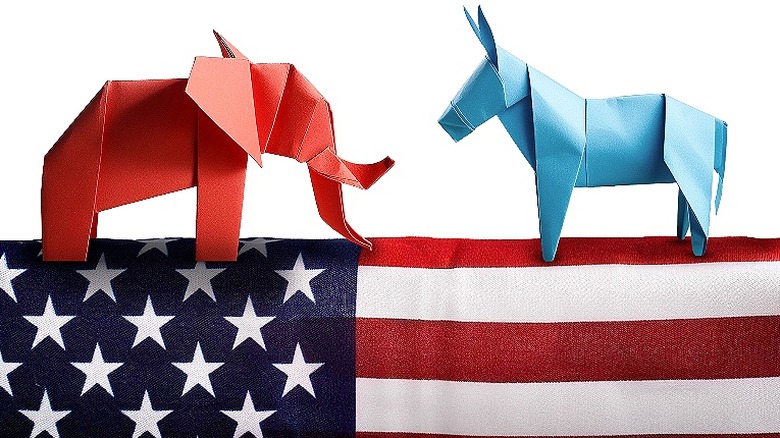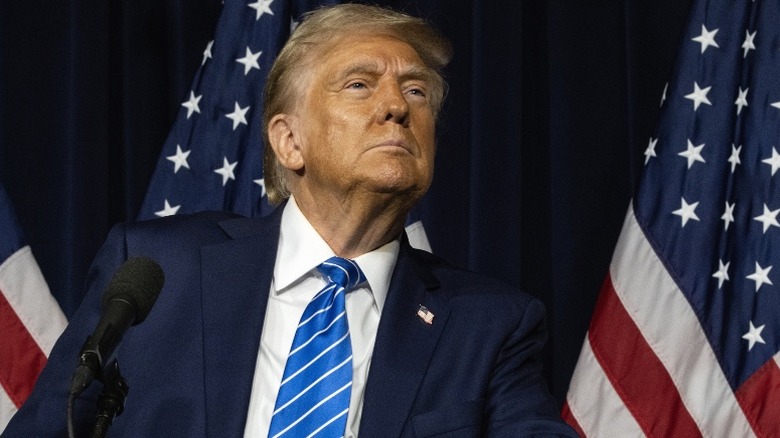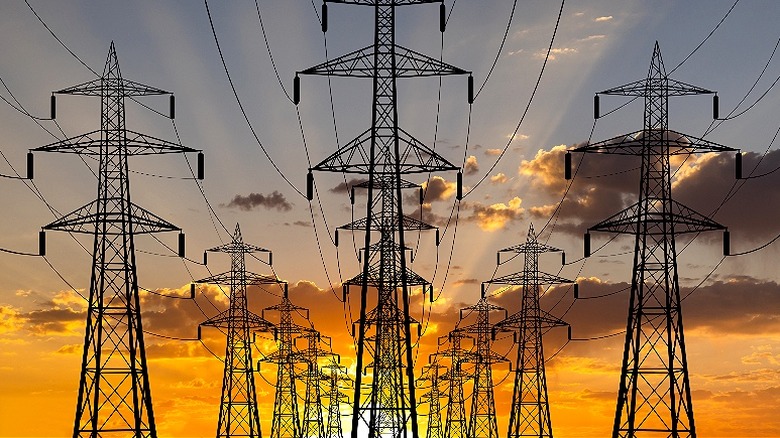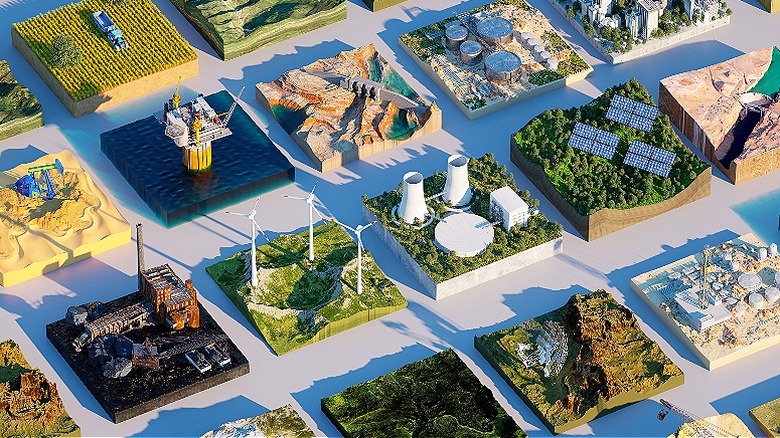Trump's 'Dramatic' Answer To Dave Ramsey's Inflation Question Speaks Volumes
Dave Ramsey is well-known for his unique takes on all things financial, like when to take Social Security benefits and how to manage debt products. Ramsey is perhaps best known for his "baby steps" approach to creating and maintaining a winning strategy for personal financial stability. He's fiscally and socially conservative in his views, but he's also quick to point out that while politics can play a role in money and markets, most people aren't going to be primarily moved by the goings-on in Washington. Instead, Ramsey points out people are generally "not concerned with a lot of things, but they are concerned with $8 eggs, $5 gas, 7% interest rates, and a house they can't afford with wages not going up as fast as house prices."
This insight came from an episode of "The Ramsey Show," airing on October 2, 2024; an episode that featured a conversation with one of the candidates for United States president: Donald Trump. In this interview, Ramsey makes no bones about a major issue Americans face: inflation. He's also on the record calling both Trump and Vice President Kamala Harris as not being "fiscally responsible human beings," suggesting that neither candidate will "be your savior" when it comes to political or economic needle movement. Even so, in his talk with Trump, Ramsey gets right to the heart of the matter, asking, "this inflation thing's a big deal ... What are the first things you're gonna do on that?"
The bare facts
Supporters of both presidential candidates will point to plenty of strengths they see in their chosen political personality, but questions over the economy are a different matter. Both Donald Trump and Kamala Harris have touted a robust economy while they were in office (although Harris is not the present administration's chief), and voters seem to be having a hard time making sense of who they think will perform better in this regard. Polling published by The Associated Press in late September shows the candidates neck and neck when it comes to the question "who would do a better job of handling the economy."
Meanwhile, CBS News reported back in June 2024 that a letter signed by 16 of the world's most important economists reads in part: "There is rightly a worry that Donald Trump will reignite this inflation [a worry the letter notes affects many Americans], with his fiscally irresponsible budgets." Kamala Harris, on the other hand, holds "a very different economic vision than Donald Trump's," according to NPR. She has floated an expansion to the Child Tax Credit, is seeking to raise corporate tax rates, and has talked about taxing unrealized gains of the ultra-wealthy to limit a particular tax loophole that billionaires often exploit. Harris has also talked about price gouging in the grocery store, a measure that economists sometimes consider a red herring issue that only rears its head in limited circumstances (such as cleaning and personal hygiene products in the early days of the pandemic's spread).
Trump's 'dramatic' answer
Returning to Donald Trump and his response to Dave Ramsey, he agrees that inflation is of major importance. "Well in terms of inflation, you're right; and it's almost inflation over the economy if you wanna really know ... they say it's the highest in 48 years, I think it's the highest ever," he starts. "It's because of what they did with energy ... The first thing you need to do is get the energy down, if you get the energy down, other things are gonna follow." There is absolutely substance to this argument, and organizations like CEPR note that "households experiencing an increase in energy prices increase their inflation expectations significantly." And Jonathan Batten, writing in Energy Economics states: "Increases in energy prices not only cause economic growth to slow, but can also cause inflation to increase."
Trump goes on to suggest that he thinks that a second term in office might begin with a sharply declining energy cost to Americans. "I believe I'll be able to get energy down to 50% – 50, five-oh percent – of what it is right now, within a period of less than a year, that's pretty good," to which Ramsey asked, "What causes that?" Trump answered, "They're gonna drill, they're gonna frack, they're gonna do things ..." Said Ramsey in response, "That's pretty dramatic."
Beyond drilling and fracking, and at Ramsey's suggestion that regulations be stripped away, the answer doesn't contain any more than these goals, so it's left unclear for Americans how a potential increase in energy production might ultimately be accomplished or how new energy policy may drastically slash prices at the pump or in heating and electricity costs in the U.S.
Some needed context
In all things politics, there's always a need to find contextualization. Politicians across the aisle rarely speak plainly or with enough clarity to require no additional context. This is partially down to a divergence of holding an audience's attention and providing as much detail as might be necessary. However, political types also look to shy away from the negatives of a question's undertone, too, leaving the truth occasionally devoid of any meaningful background substance.
For starters, the idea of reengaging with efforts to open the Keystone XL pipeline is dead in the water. TC Energy, the Canadian energy infrastructure firm responsible for the project, abandoned the effort entirely in 2021. And if moving petroleum production through this pipeline sits at the heart of Donald Trump's strategy (which it appears is the case based on his comments to Dave Ramsey, i.e., "So you turn back on the Keystone ...," "Yeah, it's drill baby drill."), then the plan itself is equally adrift.
Similarly, fracking techniques are already used in extracting 65% of all crude oil products and 79% of natural gas in America, according to Yale. Not only does this strip away some of the heft that a claim of enhancing fracking efforts purports to make, but there have been consistent reports of health risks associated with the practice for at least two decades. The United States Geological Survey also notes that fracking increases the incidence of earthquakes in the target region, reporting that 2% of earthquakes in Oklahoma "are linked to hydraulic fracturing operations."
At the end of the day, energy independence is of course an important goal, and managing prices at the pump can certainly go a long way to reducing economic pressures felt by American consumers in their everyday routines. It's just not clear that Donald Trump's vision for American energy lines up with his stated target.
Factors that influence US energy prices
Supply is of course a key element in any conversation about energy costs in 2024. But it's not the only thing of note. Energy prices have risen at a consistent rate of roughly 3% over the last 20 years, vaguely in line with the natural pace of inflation. However, costs are also increasing due to additional demand, something that a surge of new petroleum products can't necessarily mitigate. More people means more draw on the national grid, which in turn requires new investments in infrastructure and production solutions. An infusion of one type of source material won't do the consumer any good if there isn't requisite effort placed in expanding production capability alongside a growing reserve of oil, natural gas, or other raw materials.
Similarly, American power infrastructure is old. The nonprofit Americans for a Clean Energy Grid reports that the majority of the United States' existing power infrastructure is more than 30 years old, and because of this lagging age, it's not prepared for new energy production cropping up in novel parts of the country. Renewables are equally valid as a means of power production, and they offer an avenue for creating a huge volume of new jobs — 142,000 in 2023 alone, as reported by Reuters.
Aging infrastructure, meanwhile, increases costs by limiting the infusion of new energy sources while also adding substantial maintenance costs and replacement expenses into the mix. Instead of reaching back toward old models of energy production, many experts (such as those at the Center for American Progress and McKinsey) in the field prefer a model that continues to tap into existing resources while seeking to fold new methods into the mix for a more versatile and resilient power grid that's more cost-effective for consumers as well.
